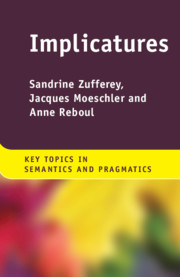Book contents
- Implicatures
- Key Topics in Semantics and Pragmatics
- Implicatures
- Copyright page
- Contents
- Figures
- Tables
- Preface
- Part I Theoretical Foundations
- Part II Types of Implicature
- Part III Empirical Evidence
- 7 Implicatures and Language Processing
- 8 The Acquisition of Implicatures in the Course of First Language Development
- 9 Implicatures and Second Language Acquisition
- Conclusion
- Glossary
- References
- Index
9 - Implicatures and Second Language Acquisition
from Part III - Empirical Evidence
Published online by Cambridge University Press: 10 June 2019
- Implicatures
- Key Topics in Semantics and Pragmatics
- Implicatures
- Copyright page
- Contents
- Figures
- Tables
- Preface
- Part I Theoretical Foundations
- Part II Types of Implicature
- Part III Empirical Evidence
- 7 Implicatures and Language Processing
- 8 The Acquisition of Implicatures in the Course of First Language Development
- 9 Implicatures and Second Language Acquisition
- Conclusion
- Glossary
- References
- Index
Summary
This chapter discusses the ability of second language learners to derive implicatures. It starts from the observation that Grice’s maxims do not seem to apply in all cultures. These cultural differences explain in part why second language learners experience difficulties with implicatures. The chapter also reviews the roles of other factors, such as the level of linguistic proficiency. The chapter also addresses the main similarities between children acquiring their first language and second language learners. One of the main differences is the existence of language transfer in the case of learners, a notion that is discussed and illustrated with respect to its relation to the phenomenon of implicatures.
Keywords
- Type
- Chapter
- Information
- Implicatures , pp. 191 - 210Publisher: Cambridge University PressPrint publication year: 2019

